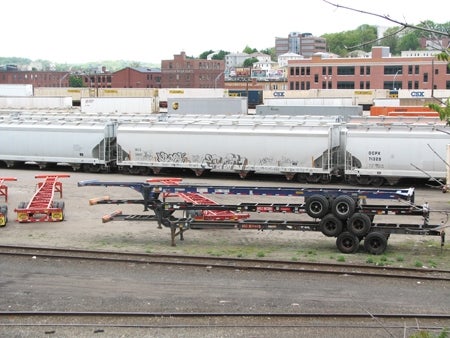The holdout — it’s a time-tested strategy when trying to come to an agreement on a price. Professional athletes do it routinely.
The practice is almost every bit as routine in real estate and though they won’t admit it, property owners who abut CSX Corp.’s massive Worcester rail yard expansion project do not intend to sell until they get exactly what they want.
But there are a couple of factors playing against them.
First, CSX has said that if it can’t come to an agreement to buy the properties it wants to acquire, it’ll take them by eminent domain.
Also, the properties CSX intends to include in its expansion still have to go through an environmental impact study, which could dent the potential value of the parcels to be acquired.
“Don’t budge.” That’s the advice City Councilor Philip P. Palmieri is giving his constituents with property on CSX’s shopping list.
Art Of Negotiation
Palmieri relies on history to explain why CSX has been able to scoop up only about half of the 13 properties it needs acquire to complete the project.
When St. Vincent Hospital and the former Worcester Common Outlet Mall were developed downtown, property owners “got millions of dollars,” Palmieri said. “And that’s what these folks know.”
Now, the mall is defunct and the project to revitalize that area as CitySquare has dragged on in fits and starts until very recently.
Compare that to a project that promises the expansion of commuter rail to a famously underserved area of the state.
“Is commuter rail extraordinarily important for the region?” Palmieri asked rhetorically. “Absolutely, and that makes (properties along the rail yard) even more valuable. People should be given more than market rate because they’ve been there a long time. They should be given relocation assistance. CSX can afford it.”
The CSX project is expected to cost $100 million. Boosters of the project, including several city and state officials, have heralded as a linchpin for economic development for the city and the region.
But the cost and hardship associated with relocating a longstanding business is what two property owners neighboring the development are worried about.
Edward C. Bassett, a Mirick O’Connell lawyer representing Leroy & Co., a scrap metal business at 567 Franklin St., said holding out for more money is not the company’s sales strategy.
“They have been operating at this location for 52 years, and they don’t want to be put out of business,” Bassett argued.
He said Leroy & Co. doesn’t really want to stand in CSX’s way. It has looked around for a new location, but finding something suitable has been difficult.
On top of that, any property Leroy & Co. settles on will probably require the scrap metal company to apply for a special zoning permit, which could be time consuming and unpredictable.
“They’ve pleaded with the railroad to relocate it, but they’ve heard nothing,” Bassett said.
“At this point in time, what (CSX) is saying is, ‘We will offer you X dollars, but depending on what we learn about your property, we may take that off the table and take it by eminent domain.’”
Indeed, Mark L. Donahue, a partner at Worcester law firm Fletcher Tilton & Whipple and lawyer representing L&R Sales Inc. at 310 Franklin St., said, “eminent domain changes the paradigm of the negotiations.”
L&R, a distributor of kitchen hardware and surfaces, needs loading docks, proximity to the highway and a generous amount of storage space. Moving isn’t a simple endeavor.
“They don’t have a lot of choices,” Donahue said.
Donahue insisted that L&R wants to deal with CSX and wants to “find a place where they can be and get out of CSX’s way.” But CSX’s approach, which Donahue characterized as, “Get out. That’s your problem,” has given the negotiations a sour note.
The Squeeze
What property owners may not fully know is how important their parcels really are to CSX.
The whole situation has “sell now” written all over it, despite Palmieri’s admonition not to budge. If a property owner refuses to sell, what happens if the environmental review shows some kind of contamination? CSX will certainly be looking to reduce any prior offer, no matter how unsatisfactory it was to the seller.
Still won’t sell? CSX will simply take the property.
Palmieri said he wouldn’t be surprised if CSX forces at least some property owners out by eminent domain, but it all depends on how successful the company is at acquiring those properties that are absolutely essential for the development of the rail yard.
Chief among them is a property along Putnam Lane owned by Princeton Development LLC, an organization set up by Lowell-based Princeton Properties, which owns a 400-unit apartment complex.
The property may be difficult to value. Princeton bought it for $4 million, but makes about $5 million on it annually, Palmieri asserted.
“How do you value that?” he wondered. “Putnam Lane, the railroad absolutely has to have those properties in order for this to get done. Once Princeton Properties is resolved, they’re well, well, well on their way. They are the critical property in the mix. Once that’s resolved, I think we’ll see things moving faster and faster.”

